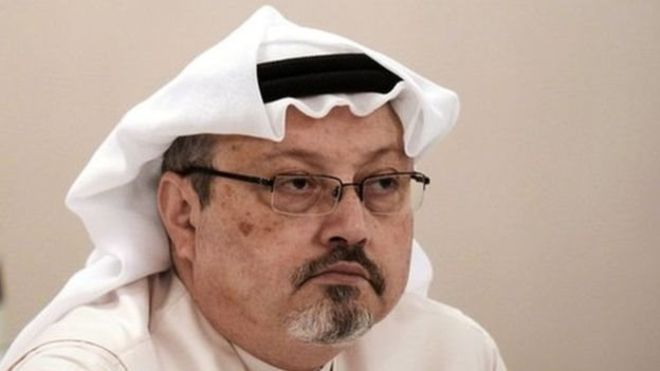Saudi Arabia faced international scrutiny of its human rights record at the United Nations Human Rights Council on November 5, 2018, as countries pressed for concrete steps to end abuses, Human Rights Watch said today.
Country representatives gathering in Geneva for the periodic review of Saudi Arabia’s human rights record made recommendations that included the immediate release of Saudi activists – including women driving activists – jailed solely for peacefully advocating reform. They also called for an end to discrimination against women and justice for the slain journalist Jamal Khashoggi, including assuring accountability for his killers.
“Many countries have problematic records, but Saudi Arabia stands out for its extraordinarily high levels of repression, which have come into focus in the aftermath of Jamal Khashoggi’s brutal murder,” said Michael Page, deputy Middle East director at Human Rights Watch. “Saudi Arabia should respond to international criticism of its human rights record and make meaningful changes, including the immediate release of jailed human rights defenders as a first step.”
Among the recommendations were to respect freedom of expression and the rights of human rights defenders. Since Mohammad bin Salman became crown prince in June 2017, Saudi authorities have escalated an intensified a coordinated crackdown on dissidents and human rights activists.
On May 15, just weeks before the Saudi authorities lifted the ban on women driving on June 24, Saudi authorities began arresting prominent women’s rights activists, accusing several of them of grave crimes such as treason that appear to be directly related to their activism. By September, at least nine women remained detained without charge, though some anticipated charges could carry prison terms of up to 20 years. The nine are Loujain al-Hathloul, Aziza al-Yousef, Eman al-Nafjan, Nouf Abdelaziz, Mayaa al-Zahrani, Hatoon al-Fassi, Samar Badawi, Nassema al-Sadah, and Amal al-Harbi.
More than a dozen prominent activists convicted on charges arising from their peaceful activities are serving long prison sentences. They include Waleed Abu al-Khair, a human rights lawyer serving a 15-year sentence imposed by the Specialized Criminal Court in 2014, on charges stemming solely from his peaceful criticism of rights abuses in media interviews and on social media.
Regarding the Khashoggi killing, recommendations during the November 5 session included inviting “a team of international experts to participate in the investigation,” as well as collaborating with the Human Rights Council to “establish a hybrid mechanism for the impartial and independent investigation.” On October 20, Saudi Arabia admitted that people acting on behalf of Saudi Arabia had murdered Khashoggi at the country’s consulate in Istanbul, Turkey on October 2.
Human Rights Watch has said that other countries should reject Saudi Arabia’s attempted whitewash of the killing and that the UN should open an investigation to independently determine the circumstances surrounding the killing. The inquiry should include determining Saudi Arabia’s role, and identifying those responsible for authorizing, planning, and carrying out the apparently brutal murder.
Saudi Arabia also faced calls to abide by international humanitarian law in its military operations in Yemen. The Saudi-led coalition has committed numerous violations of international humanitarian law, including apparent war crimes, and has failed to carry out meaningful and impartial investigations into alleged violations. The work of the Joint Incidents Assessment Team (JIAT), established by the coalition in 2016, has fallen far short of international standards regarding transparency, impartiality, and independence. As of September, the unit had cleared the coalition of wrongdoing in the vast majority of airstrikes investigated.
Country representatives also recommended that Saudi Arabia end discrimination against women, including by ending the discriminatory male guardianship system. Under this system, women are not allowed to apply for a passport, marry, travel, or be released from prison without the approval of a male guardian, usually a husband, father, brother, or son. One country urged Saudi Arabia to guarantee women’s rights by enacting anti-discrimination legislation.
Saudi Arabia faced numerous calls to end the death penalty or adopt a moratorium on executions, especially for child offenders and for people convicted of “non-serious crimes.” Saudi Arabia has executed over 650 people since its previous Universal Periodic Review in 2013, over 200 of them for nonviolent drug crimes. International standards, including the Arab Charter on Human Rights, ratified by Saudi Arabia, require countries that retain the death penalty to use it only for the “most serious crimes,” and in exceptional circumstances.
In 2018, Saudi authorities began seeking the death penalty against dissidents in trials that did not include accusations of violence, including for supporting protests and alleged affiliation with the Muslim Brotherhood. A handful of men are on death row for offenses allegedly committed when they were children.
Country representatives also said that Saudi Arabia should accede to major human rights treaties and covenants, including the International Covenant on Civil and Political Rights (ICCPR) and the International Covenant on Economic, Social, and Cultural Rights (ICESCR), which along with Universal Declaration of Human Rights make up the International Bill of Human Rights. Saudi Arabia is one of only a handful of countries in the world that have not signed or ratified those treaties, though Saudi representatives have claimed since 2009 that ratification is under consideration.
“The world should seize this opportunity to demand justice for Saudi Arabia’s serious rights abuses and harmful practices, many of which have been going on for decades,” Page said.



 العربية
العربية